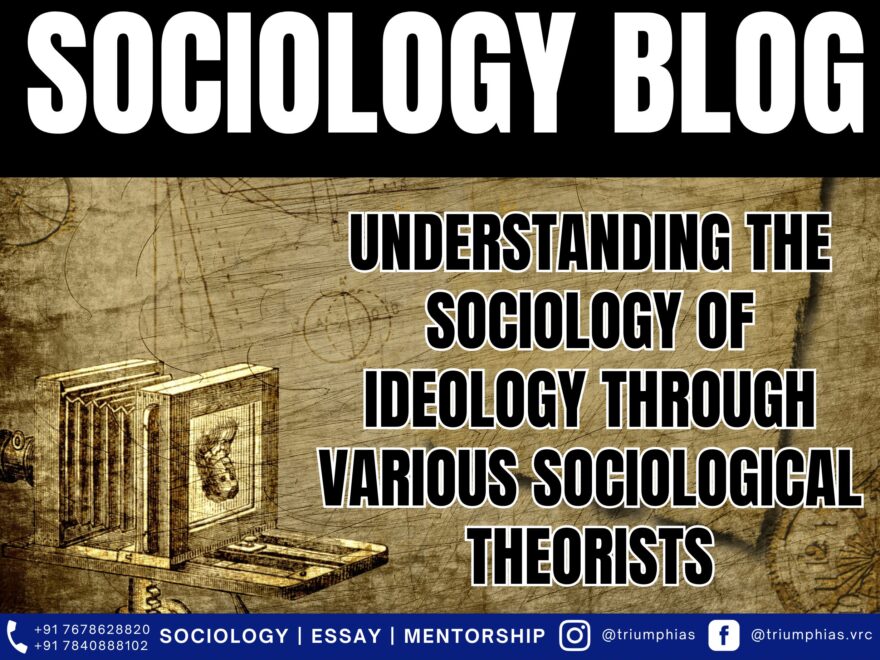

Understanding the Sociology of Ideology Through Various Sociological Theorists
(Relevant for Sociology Optional for Civil Services Examination)
Paper 1: Unit-4 Sociological Thinkers
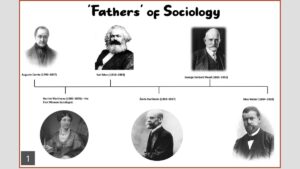
Understanding the Sociology of Ideology
Through Various Sociological Theorists
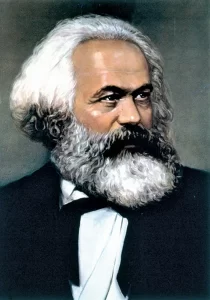 When we talk about ideology from a sociological perspective, we are delving deep into a rich and complex history, notably marked by the works of Karl Marx. The term “Ideology,” especially in sociology, often aligns with Marxist perspectives or analyses which draw heavy influences from Marxist theory. However, it’s crucial to remember that this concept doesn’t just stay put in one sociological tradition. The sphere of ideas, culture, and especially political ideas, along with how these realms of ideas intertwine with politics and economics, has been a topic of lengthy discussions in various sociological circles, such as those among Weberians, Durkheimians, and Structuralists. Diving into Marx’s explanations about ideology, it’s interesting to note that while his discussions were multifaceted and at times, conflicting, they were fundamentally aimed at explaining why ideas, and particularly political ideas, form and take hold in society. In “The German Ideology,” written in 1846, Marx embarked on a journey to explain not only his own shift away from Hegelian idealism but also to shed light on why such ideas had such a compelling hold over him and many others. At the very core of his argument, beyond all debatable intricacies, Marx disputed Hegel’s primary tenet that ideas drive history and proposed instead that this belief was, in itself, ideological. This ideology emerged from a concealed history, particularly a history of ‘real, active men’ or what he later called the ‘history of class struggles.’ Marx’s argument encapsulates: firstly, the early form of Marx’s base and superstructure model, which implies that the world of ideas is both separate from and shaped by the economic world; and secondly, the idea that the ideological nature of some (dominant) ideas is founded on their ability to conceal realities in favor of the ruling class. If we go deeper into Marx’s exploration, especially in the first chapter of “Capital” written in 1867, we find an elaborative explanation of how a gap can exist between the real economic and societal conditions and the way people perceive them to be. Marx used an interesting analogy with ‘the mist-enveloped regions of the religious world’ to explain that in this realm, creations of the human brain appear to have their own life and relationships, which he termed as Fetishism, particularly seen in labor products in capitalist societies. The end result of this fetishism is that people, including bourgeois economists, Christian clerics, and lawyers, perceive a world where the values of commodities seem intrinsic to the commodities themselves. However, Marx argued, these values actually emerge from certain interpersonal relations which are hidden from view by all the acts of buying, selling, and justifying, which, as Marx asserts, are necessary because ‘commodities cannot go to market and make exchanges on their own account.’ |
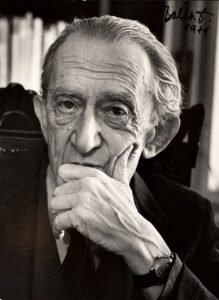 Various scholars such as György Lukács and Louis Althusser have built upon Marx’s metaphor of fetishism. Lukács, influenced by Weber, applied it to his theory of false consciousness, whereas Althusser, leaning into Durkheim and structuralism, expanded Marx’s ideas, conceiving the ideological relation as ‘imaginary’ and defining the mechanism by which individuals are situated within such a relation through interpellation. |
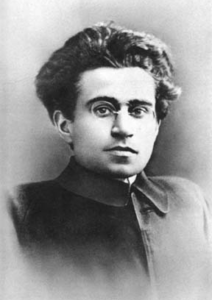 In the more recent context, numerous scholars, often influenced by Antonio Gramsci’s concept of hegemony, have aimed to intertwine various linguistic and discursive analytical concepts into ideology theory. This is in hopes of investigating the internal workings of the ideological realm, to provide a more detailed insight into what many call its relative autonomy, and to provide more sophisticated accounts of how a society’s ‘ruling ideas’ are produced, more sophisticated than those explanations permitted by the theory of commodity fetishism. |
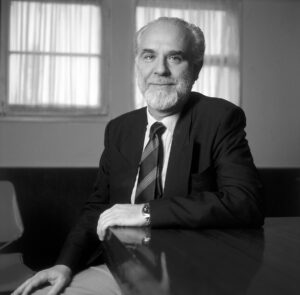 For those keen on delving further into the densely packed sociological literature on ideology, “The Concept of Ideology” by Jorge Larrain and “Ideology” by Terry Eagleton serve as reasonably accessible introductions. Further explorations might include investigations into DOMINANT IDEOLOGY THESIS, DUAL CONSCIOUSNESS, GOULDNER, HEGEMONY, and IDEOLOGICAL STATE APPARATUS. |
Frequently Asked Questions:
Question 1: Explain the concept of “Fetishism” as proposed by Karl Marx in the context of capitalist societies.
Answer: “Fetishism,” according to Karl Marx, refers to the misperception in capitalist societies where the products of labor (commodities) are seen as having intrinsic value in themselves, obscuring the social relationships and labor conditions underlying their production, and leading to a distorted understanding of social and economic realities.
Question 2: Elucidate on the term “Hegemony” as conceptualized by Antonio Gramsci in sociological discourses.
Answer: Antonio Gramsci’s concept of “Hegemony” refers to the dominance or control of one group over others, not only through coercive means but significantly through cultural and ideological means, wherein the dominant group’s values, norms, and beliefs become the ‘common sense’ or naturalized in society, thereby maintaining their power and status.
Question 3: Define “Ideological State Apparatus” as per the framework of Louis Althusser and its role in maintaining the status quo in society.
Answer: Louis Althusser’s “Ideological State Apparatus” refers to institutions like schools, churches, and media that subtly convey and reproduce the dominant ideology, maintaining existing power structures and relations within society by shaping beliefs, values, and perspectives of individuals, thereby ensuring conformity and perpetuating the existing social order.
Question 4: How did György Lukács utilize Marx’s concept of Fetishism in developing his theory of “False Consciousness”?
Answer: György Lukács utilized Marx’s concept of Fetishism to develop his theory of “False Consciousness,” wherein he posited that the proletariat is often unaware or misled about their own best interests and the underlying realities of their exploitation due to the dominant capitalist ideologies, which conceal the true nature of social and economic relations, preventing revolutionary consciousness.
Question 5: Illustrate briefly the significance of “The German Ideology” in Karl Marx’s theoretical development regarding societal structures and ideologies.
Answer: “The German Ideology,” written by Karl Marx, is pivotal in illustrating his departure from Hegelian idealism and developing his materialist conception of history and society. It elucidates Marx’s theory that societal structures and ideologies are deeply rooted in material conditions and class struggles, emphasizing that the prevailing ideas of an epoch serve the interests of the ruling class and obscure the realities of social relations and exploitation.
Reference: Static Portion
Related Blogs …
 |
 |

To master these intricacies and fare well in the Sociology Optional Syllabus, aspiring sociologists might benefit from guidance by the Best Sociology Optional Teacher and participation in the Best Sociology Optional Coaching. These avenues provide comprehensive assistance, ensuring a solid understanding of sociology’s diverse methodologies and techniques.
META TAGS:
Sociology of Ideology, Ideology in Sociology, what is ideology, ideology upsc, ideology sociology upsc, ideology in india, ideology in India culture, Sociology, Ideology, Karl Marx, György Lukács, Louis Althusser, The German Ideology, Capital, Marxist Theory, Fetishism, False Consciousness, Structuralism, Hegemony, Antonio Gramsci, Bourgeois Economists, Political Ideas, Economic Ideas, Historical Materialism, Interpellation, Ideological State Apparatus, Hegelian Idealism, Base and Superstructure Model, Dominant Ideology Thesis, Dual Consciousness, Cultural and Political Ideas
Why Vikash Ranjan’s Classes for Sociology?
Proper guidance and assistance are required to learn the skill of interlinking current happenings with the conventional topics. VIKASH RANJAN SIR at TRIUMPH IAS guides students according to the Recent Trends of UPSC, making him the Best Sociology Teacher for Sociology Optional UPSC.
At Triumph IAS, the Best Sociology Optional Coaching platform, we not only provide the best study material and applied classes for Sociology for IAS but also conduct regular assignments and class tests to assess candidates’ writing skills and understanding of the subject.
Choose The Best Sociology Optional Teacher for IAS Preparation?
At the beginning of the journey for Civil Services Examination preparation, many students face a pivotal decision – selecting their optional subject. Questions such as “which optional subject is the best?” and “which optional subject is the most scoring?” frequently come to mind. Choosing the right optional subject, like choosing the best sociology optional teacher, is a subjective yet vital step that requires a thoughtful decision based on facts. A misstep in this crucial decision can indeed prove disastrous.
Ever since the exam pattern was revamped in 2013, the UPSC has eliminated the need for a second optional subject. Now, candidates have to choose only one optional subject for the UPSC Mains, which has two papers of 250 marks each. One of the compelling choices for many has been the sociology optional. However, it’s strongly advised to decide on your optional subject for mains well ahead of time to get sufficient time to complete the syllabus. After all, most students score similarly in General Studies Papers; it’s the score in the optional subject & essay that contributes significantly to the final selection.
“A sound strategy does not rely solely on the popular
Opinion of toppers or famous YouTubers cum teachers.”
It requires understanding one’s ability, interest, and the relevance of the subject, not just for the exam but also for life in general. Hence, when selecting the best sociology teacher, one must consider the usefulness of sociology optional coaching in General Studies, Essay, and Personality Test.
The choice of the optional subject should be based on objective criteria, such as the nature, scope, and size of the syllabus, uniformity and stability in the question pattern, relevance of the syllabic content in daily life in society, and the availability of study material and guidance. For example, choosing the best sociology optional coaching can ensure access to top-quality study materials and experienced teachers. Always remember, the approach of the UPSC optional subject differs from your academic studies of subjects. Therefore, before settling for sociology optional, you need to analyze the syllabus, previous years’ pattern, subject requirements (be it ideal, visionary, numerical, conceptual theoretical), and your comfort level with the subject.
This decision marks a critical point in your UPSC – CSE journey, potentially determining your success in a career in IAS/Civil Services. Therefore, it’s crucial to choose wisely, whether it’s the optional subject or the best sociology optional teacher. Always base your decision on accurate facts, and never let your emotional biases guide your choices. After all, the search for the best sociology optional coaching is about finding the perfect fit for your unique academic needs and aspirations.
Follow us :



Find More Blogs…
| Compare and contrast Karl Marx’s and Max weber’s | Karl Marx- Historical Materialism |
| Position of Women In the Modern Indian Society | Sociology: Social system and pattern variables |

